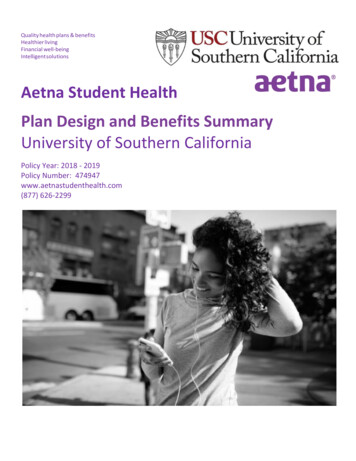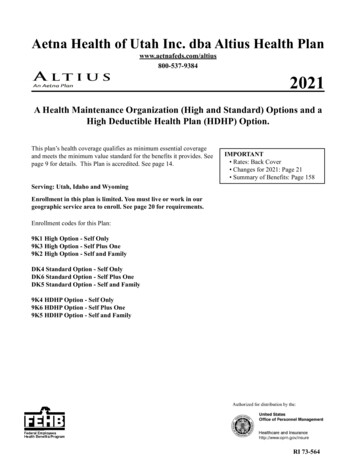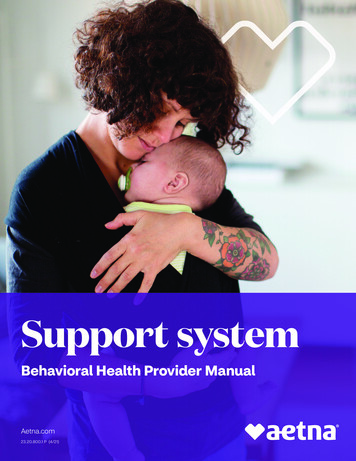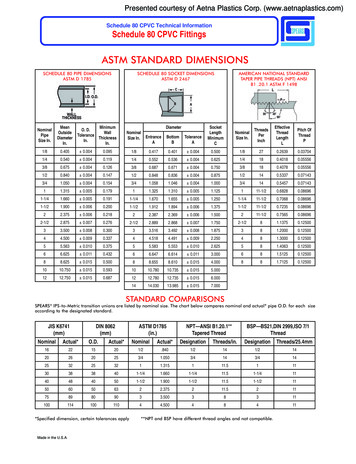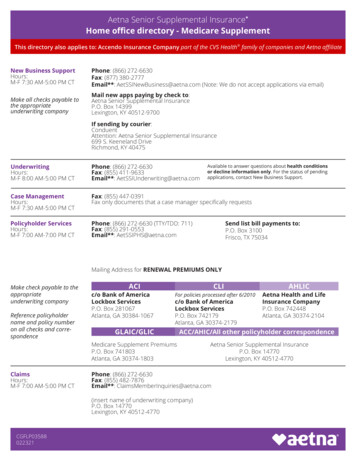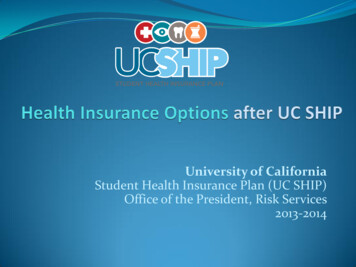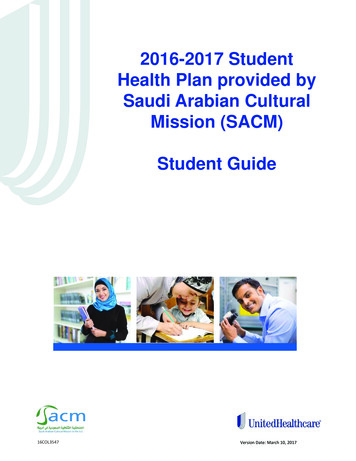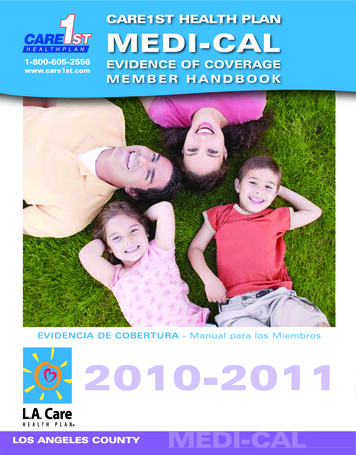
Transcription
Aetna Student HealthPlan Design and Benefits SummaryQuinnipiac UniversityPolicy Year: 2016 - 2017Policy Number: 867888Customer Service: (866) 746-6590www.aetnastudenthealth.com
This is a brief description of the Student Health Plan. The Plan is available for Quinnipiac University students and theireligible dependents. The Plan is underwritten by Aetna Life Insurance Company (Aetna). The exact provisions governingthis insurance, including definitions, are contained in the Master Policy issued to Quinnipiac University and may beviewed online at www.aetnastudenthealth.com. If any discrepancy exists between this Brochure and the Policy, theMaster Policy will govern and control the payment of benefits.Coverage PeriodsStudents: Coverage will become effective at 12:01 AM on the Coverage Start Date indicated below, and will terminate at11:59 PM on the Coverage End Date indicated.Eligible Dependents: Coverage will become effective at 12:01 AM on the Coverage Start Date indicated below and willterminate at 11:59 PM on the Coverage End Date indicated. Coverage for insured dependents terminates in accordancewith the Termination Provisions described in the Master Policy.Coverage PeriodCoverage Start DateCoverage End DateWaiver/Enrollment /Summer01/01/201708/14/2017TBDRates2016-2017 Rates*Hard Waiver Undergraduate Students and DependentsAnnualSpring/ SummerStudent 2,150 1,317Spouse 2,030 1,257One Child 2,030 1,257Two or More Children 4,060 2,514*The rates above are inclusive of any fees that may be assessed by Gallagher Student Health and by your school.2016-2017 Rates*Hard Waiver Graduate Students and DependentsAnnualSpring/ SummerStudent 2,450 1,511Spouse 2,393 1,481One Child 2,393 1,481Two or More Children 4,786 2,962*The rates above are inclusive of any fees that may be assessed by Gallagher Student Health and by your school.Quinnipiac University 2016-2017Page 2
Student CoverageEligibilityAll full-time Domestic undergraduate and graduate students are automatically enrolled in and billed for the StudentHealth Insurance Plan, unless proof of comparable coverage is provided. All international students are required toparticipate and are automatically enrolled in the Student Health Plan at registration.All students must be enrolled at Quinnipiac University, and actively attend classes for at least the first 31 days, after thedate when coverage becomes effective.Home study, correspondence, Internet classes, and television (TV) courses, do not fulfill the eligibility requirement thatthe student actively attend classes. If it is discovered that this eligibility requirement has not been met, our onlyobligation is to refund premium, less any claims paid.EnrollmentEligible students are required to enroll in the Student Health Insurance Plan by the specified enrollment deadlines listedabove.WaiverEligible students are required to waive the Student Health Insurance Plan by the specified waiver deadlines listed above.To Waive Online:1.2.3.4.Log onto www.gallagherstudent.com/Quinnipiac.Click on the “Student Waive/Enroll” tab.Log in (if you haven’t already).Once logged in, click on the blue “I want to Waive/Enroll” button. Follow the online instructions to waive.Immediately upon submitting the Waiver Form, you will receive a reference number indicating that the form has beensuccessfully submitted. Print this reference number for your records. If you do not receive a reference number, you willneed to correct any errors and resubmit the form. The online process is the only accepted process for waiving coverage.Dependent CoverageEligibilityCovered students may also enroll their spouse and dependent children up to the age of 26.EnrollmentTo enroll the dependent(s) of a covered student, Please refer to the Coverage Periods section of this document forcoverage dates and deadline dates.To Enroll Dependents Online:1. Log onto www.gallagherstudent.com/Quinnipiac.2. Click on the “Dependent Enroll” tab.3. Log in (if you haven’t already).4. Once logged in, click on the “Dependent Enroll” button. Follow the online instructions to enroll.Quinnipiac University 2016-2017Page 3
Dependent enrollment applications will not be accepted after the enrollment deadline, unless there is a significant lifechange that directly affects their insurance coverage. (An example of a significant life change would be loss of healthcoverage under another health plan.)Medicare NoticeA person who is eligible for Medicare at the time of enrollment under this plan is not eligible for medical expensecoverage and prescribed medicines expense coverage. If a covered person becomes eligible for Medicare after he or sheis enrolled in this plan, such Medicare eligibility will not result in the termination of medical expense coverage andprescribed medicines expense coverage under this plan. As used within this provision, persons are “eligible forMedicare” if they are entitled to benefits under Part A (receiving free Part A) or enrolled in Part B or Premium Part A.Preferred Provider NetworkAetna Student Health has arranged for you to access a Preferred Provider Network in your local community. Tomaximize your savings and reduce your out-of-pocket expenses, select a Preferred Provider. It is to your advantage touse a Preferred Provider because savings may be achieved from the Negotiated Charges these providers have agreed toaccept as payment for their services.If a service or supply that a covered person needs is covered under the Plan but not available from a Preferred CareProvider, covered persons should contact Member Services for assistance at the toll-free number on the back of the IDcard. In this situation, Aetna may issue a pre-approval for a covered person to obtain the service or supply from a NonPreferred Care Provider. When a pre-approval is issued by Aetna, covered medical expenses are reimbursed at thePreferred Care network level of benefits.Pre-certification ProgramYour Plan requires pre-certification for certain services, such as inpatient stays, certain tests, procedures, outpatientsurgery, therapies and equipment, and prescribed medications. Pre-certification simply means calling Aetna StudentHealth prior to treatment to get approval for coverage under your Plan for a medical procedure or service. For preferredcare and designated care, the preferred care or designated care provider is responsible for obtaining pre-certificationPre-certification is the preferred care or designated care provider’s responsibility, and there is no additional out-of pocket cost to you as a result of a designated care provider’s or a preferred care provider's failure to pre-certify services.For non-preferred care, you are responsible for obtaining pre-certification which can be initiated by you, a member ofyour family, a hospital staff member or the attending physician. The pre-certification process can be initiated by callingAetna at the telephone number listed on your ID card.Pre-certification for the following inpatient and outpatient services or supplies may be needed*: All inpatient maternity and newborn care, after the initial 48 hours for a vaginal delivery or 96 hours for a cesareansection;Ambulance (emergency transportation by airplane);Autologous chondrocyte implantation, Carticel ;Bariatric surgery (bariatric surgery is not covered under the Policy unless specifically described in the Policy);BRCA genetic testing;Cardiac rhythm implantable devices;Cochlear device and/or implantation;Dental implants and oral appliances;Dorsal column (lumbar) neurostimulators: trial or implantation;Drugs and Medical Injectables;Quinnipiac University 2016-2017Page 4
Electric or motorized wheelchairs and scooters;Gender Reassignment (Sex Change) Surgery;Home health care related services (i.e. private duty nursing);Hyperbaric oxygen therapy;Infertility treatment (Comprehensive and ART infertility treatment is not covered under the plan unless specificallydescribed in the Policy);Inpatient Confinements (surgical and non-surgical); hospital, skilled nursing facility, rehabilitation facility, residentialtreatment facility for mental disorders and substance abuse, hospice care;Inpatient mental disorders treatment;Inpatient substance abuse treatment;Kidney dialysis;Knee surgery;Limb Prosthetics;Non-Preferred Care freestanding ambulatory surgical facility services when referred by a Preferred Care Provider;Oncotype DX;Orthognatic surgery procedures, bone grafts, osteotomies and surgical management of the temporomandibularjoint;Osseointegrated implant;Osteochondral allograft/knee;Outpatient back surgery not performed in a physician’s office;Pediatric Congenital Heart Surgery;Pre-implantation genetic testing;Procedures that may be considered cosmetic. Cosmetic services and supplies are not covered under the plan unlessspecifically described in the Policy;Proton beam radiotherapy;Referral or use of Non-Preferred Care Providers for non-emergency services, unless the covered person understandsand consents to the use of a Non-Preferred Care Provider under their under Non-Preferred Care benefits whenavailable in their plan;Spinal Procedures;Transplant Services;Uvulopalatopharyngoplasty, including laser-assisted procedures; andVentricular assist devices.*Your Plan may not include coverage for all of the services and supplies listed above. Please check your Master Policyfor confirmation of which services and supplies are covered and which services and supplies are excluded under yourPlan. If you cannot locate the benefit you are looking for in your Master Policy, contact Customer Service at the numberlisted on your ID card for further assistance.Pre-certification DOES NOT guarantee the payment of benefits for your inpatient stays, certain tests,procedures, outpatient surgeries, therapies and equipment, and prescribed medicationsEach claim is subject to medical policy review, in accordance with the exclusions and limitations contained in the MasterPolicy. The Master Policy also includes information regarding your eligibility criteria, notification guidelines, and benefitcoverage.Pre-certification of non-emergency admissionsNon-emergency admissions must be requested at least fifteen (15) days prior to the date they are scheduled to beadmitted.Quinnipiac University 2016-2017Page 5
Pre-certification of emergency admissionsEmergency admissions must be requested within twenty-four (24) hours or as soon as reasonably possible after theadmission.Pre-certification of urgent admissionsUrgent admissions must be requested before you are scheduled to be admitted.Pre-certification of outpatient non-emergency medical servicesOutpatient non-emergency medical services must be requested within fifteen (15) days before the outpatient services,treatments, procedures, visits or supplies are provided or scheduled.Pre-certification of prenatal care and deliveryPrenatal care medical services must be requested as soon as possible after the attending physician confirms pregnancy.Delivery medical services, which exceed the first 48 hours after delivery for a routine delivery and 96 hours for acesarean delivery, must be requested within twenty-four (24) hours of the birth or as soon thereafter as possible.Please see the “Pre-certification” provision in the Master Policy for a list of services under the Plan that require pre certification. Please see the Schedule of Benefits for any penalty or benefit reduction that may apply to your coveragewhen pre-certification is not obtained for the listed services or supplies when received from a non-preferred careprovider.Description of BenefitsThe Plan excludes coverage for certain services and contains limitations on the amounts it will pay. While this PlanDesign and Benefits Summary document will tell you about some of the important features of the Plan, other featuresmay be important to you and some may further limit what the Plan will pay. To look at the full Plan description, which iscontained in the Master Policy issued to Quinnipiac University, you may access it online atwww.aetnastudenthealth.com. If any discrepancy exists between this Brochure and the Policy, the Master Policy willgovern and control the payment of benefits. All coverage is based on Recognized Charges unless otherwise specified.This Plan will pay benefits in accordance with any applicable Connecticut Insurance Law(s).Metallic Level: Gold, Tested at 81.42%DEDUCTIBLEThe policy year deductible is waived for preferred care coveredmedical expenses that apply to Preventive Care Expense benefits.Preferred CareIndividual: 250 per Policy YearNon-Preferred CareIndividual: 500 per Policy YearIn compliance with Connecticut State Mandate(s) the Policy YearDeductible is also waived for: Bone Marrow Transplantation AntigenTesting, Initial and follow-up Colorectal Cancer Screenings and EarlyIntervention ServicesIn addition to state and federal requirements for waiver of the policyyear deductible, the plan will waive the policy year deductible forPreferred Care Pediatric Preventive Dental Services and PreferredCare and Non Preferred Care Pediatric Preventive Vision Services.*Annual Deductible does not apply to these servicesQuinnipiac University 2016-2017Page 6
COINSURANCECoinsurance is both the percentage of covered medical expenses thatthe plan pays, and the percentage of covered medical expenses thatyou pay. The percentage that the plan pays is referred to as “plancoinsurance” or the “payment percentage,” and varies by the type ofexpense. Please refer to the Schedule of Benefits for specificinformation on coinsurance amounts.OUT-OF-POCKET MAXIMUMSOnce the Individual or Family Out-of-Pocket Limit has been satisfied,Covered Medical Expenses will be payable at 100% for the remainderof the Policy Year.The following expenses do not apply toward meeting the plan’s outof-pocket limits: Non-covered medical expenses; and Expenses that are not paid because a required precertification forthe service(s) or supply was not obtained from Aetna.Preferred CareNon-Preferred CareCovered Medical Expenses are payable at theplan coinsurance percentage specified below,after any applicable Deductible.Preferred Care andNon-Preferred Care CombinedIndividual Out-of-Pocket: 6,350 per Policy YearFamily Out-of-Pocket: 12,700 per Policy YearINPATIENT HOSPITALIZATION BENEFITSRoom and Board ExpenseThe covered room and board expense does not include any charge inexcess of the daily room and board maximum.Preferred Care80% of theNegotiated ChargeNon-Preferred Care50% of theRecognized Chargefor a semi-privateroomIntensive CareThe covered room and board expense does not include any charge inexcess of the daily room and board maximum.Miscellaneous Hospital ExpenseIncludes but not limited to: operating room, laboratory tests/X rays,oxygen tent, drugs, medicines and dressings.Licensed Nurse ExpenseIncludes charges incurred by a covered person who is confined in ahospital as a resident bed patient and requires the services of aregistered nurse or licensed practical nurse.80% of theNegotiated Charge50% of theRecognized Charge80% of theNegotiated Charge50% of theRecognized Charge80% of theNegotiated Charge50% of theRecognized ChargeWell Newborn Nursery Care80% of theNegotiated Charge80% of theNegotiated Charge50% of theRecognized Charge50% of theRecognized ChargePreferred Care80% of theNegotiated ChargeNon-Preferred Care50% of theRecognized ChargeNon-Surgical Physicians ExpenseIncludes hospital charges incurred by a covered person who isconfined as an inpatient in a hospital for a surgical procedure for theservices of a physician who is not the physician who may haveperformed surgery on the covered person.SURGICAL EXPENSESSurgical Expense (Inpatient and Outpatient)When injury or sickness requires two or more surgical procedureswhich are performed through the same approach, and at the sametime or immediate succession, covered medical expenses only includeexpenses incurred for the most expensive procedure.Quinnipiac University 2016-2017Page 7
SURGICAL EXPENSES (continued)Anesthesia Expense (Inpatient and Outpatient)If, in connection with such operation, the covered person requires theservices of an anesthetist who is not employed or retained by thehospital in which the operation is performed, the expenses incurredwill be Covered Medical Expenses.Assistant Surgeon Expense (Inpatient and Outpatient)Preferred Care80% of theNegotiated ChargeNon-Preferred Care50% of theRecognized Charge80% of theNegotiated Charge50% of theRecognized ChargeOUTPATIENT EXPENSESPhysician or Specialist Office Visit ExpenseIncludes the charges made by the physician or specialist if a coveredperson requires the services of a physician or specialist in thephysician’s or specialist’s office while not confined as an inpatient in ahospital.Preferred CareAfter a 40 per visitCopay, 100% of theNegotiated ChargeNon-Preferred Care50% of theRecognized Charge80% of theNegotiated Charge80% of theNegotiated Charge80% of theNegotiated Charge50% of theRecognized Charge50% of theRecognized Charge50% of theRecognized ChargeCoverage includes medical advice, diagnosis, care or treatmentprovided through telehealth, to the extent coverage is provided forsuch advice, diagnosis, care or treatment when provided through inperson consultation between the insured and a health care provider."Telehealth" means the mode of delivering health care or otherhealth services via information and communication technologies tofacilitate the diagnosis, consultation and treatment, education, caremanagement and self-management of a patient's physical and mentalhealth, and includes (1) interaction between thepatient at the originating site and the telehealth provider at a distantsite, and (2) synchronous interactions, asynchronous store andforward transfers, or remote patient monitoring. Telehealth does notinclude the use of facsimile, audio-only telephone, texting orelectronic mail.Laboratory and X-ray ExpenseHospital Outpatient Department ExpenseTherapy ExpenseCovered medical expenses include charges incurred by a coveredperson for the following types of therapy provided on an outpatientbasis: Radiation therapy; Inhalation therapy; Chemotherapy, including anti-nausea drugs used in conjunctionwith the chemotherapy; Kidney dialysis; and Respiratory therapy.Pre-Admission Testing ExpenseIncludes charges incurred by a covered person for pre-admissiontesting charges made by a hospital, surgery center, licenseddiagnostic lab facility, or physician, in its own behalf, to test a personwhile an outpatient before scheduled surgery.Quinnipiac University 2016-2017Payable in accordance with the type ofexpense incurred and the place where serviceis provided.Page 8
OUTPATIENT EXPENSES (continued)Ambulatory Surgical ExpenseCovered medical expenses include expenses incurred by a coveredperson for outpatient surgery performed in an ambulatory surgicalcenter. Covered medical expenses must be incurred on the day of thesurgery or within 24 hours after the surgery.Walk-in Clinic Visit ExpenseEmergency Room ExpenseCovered medical expenses incurred by a covered person for servicesreceived in the emergency room of a hospital while the coveredperson is not a full-time inpatient of the hospital. The treatmentreceived must be emergency care for an emergency medicalcondition. There is no coverage for elective treatment, routine careor care for a non-emergency sickness. As to emergency care incurredfor the treatment of an emergency medical condition or psychiatriccondition, any referral requirement will not apply & any expensesincurred for non-preferred care will be paid at the same cost-sharinglevel as if they had been incurred for preferred care.Preferred Care80% of theNegotiated ChargeNon-Preferred Care50% of theRecognized ChargeAfter a 40 per visitCopay, 100% of theNegotiated ChargeAfter a 175 per visitCopay (waived ifadmitted), 100% ofthe NegotiatedCha
The Plan is available for Quinnipiac University students and their eligible dependents. The Plan is underwritten by Aetna Life Insurance Company (Aetna). The exact provisions governing this insurance, including definitions, are contained in the Master Policy issued to Quinnipiac Univers
